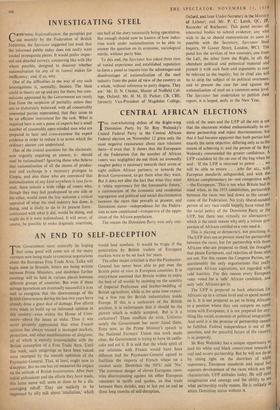CENTRAL AFRICAN ELECTIONS
THE overwhelming defeat of the Right-wing Dominion Party by Sir Roy Welensky's United Federal Party in the Central African Federal election on November 12 gives only the most negative reassurance about race relations there—if even that. It shows that the Europeans of the Federation (for the number of African voters was negligible) do not think an avowedly tougher policy is necessary towards their seven or eight million African partners, or towards the British Government, to get them what they want. But it does not alter the fact that what they want is `white supremacy for the foreseeable future,' a continuation of the economic and residential segregation and political and social discrimination between the races that prevails at present; and Dominion status—independence for the Federa- tion as now constituted—irrespective of the oppo- sition of the African population.
The reason the Dominion Party won only one- sixth of the seats and the ,UFP all the rest is not that the electorate wished enthusiastically to en- dorse partnership and reject discrimination, but that it had become apparent that both parties had exactly the same objective, differing only as to the means of achieving it; and the person of Sir Roy Welensky commanded the greater confidence. A UFP candidate let the cat out of the bag when he said : `If the UFP is returned to power . . . we will be able to ensure . . . jobs for ALL, with European standards safeguarded, and with the African complementary to—not competitive with —the Europeans.' This is not what Britain had in mind when, in the 1953 constitution, partnership between the races was laid down as the corner- stone of the Federation. No truly liberal-minded person of any race could happily have voted for the racial policy of the Dominion Party or the UFP, but there was virtually no alternative— which is the main reason why only a minute pro- portion of Africans entitled to a vote used it.
This is playing at democracy, not practising It. The UFP does not at present stand for partnership between the races, but for partnership with those Africans who are prepared to think the thoughts that please Europeans, and rejection of those who are not. For this reason the Congress Parties, un- questionably the only organisations that really represent African aspirations, are regarded with cold hostility. For this reason every European voter voted for a `safe' African candidate, and only `safe' Africans got in.
The UFP is prepared to back education for Africans up to a certain level and to spend moneY on it. It is not prepared as yet to bring Africans to a position where they can compete on equal terms with Europeans; it is not prepared for any thing like social, economic or political integration. And until it is the promise of partnership cannot be fulfilled. Federal independence is out of the question, and the peaceful future of the country is in jeopardy.
Sir Roy Welensky has a unique opportunity to lead his white and black countrymen towards a real and secure partnership. But he will not do s° by sitting tight on the doctrines of white supremacy, European standards and equal but separate development of the races which are the characteristic UFP attitudes today. He will need imagination and courage and the ability to see what partnership really means. He is unlikely 1° attain Dominion status without it.














































































 Previous page
Previous page